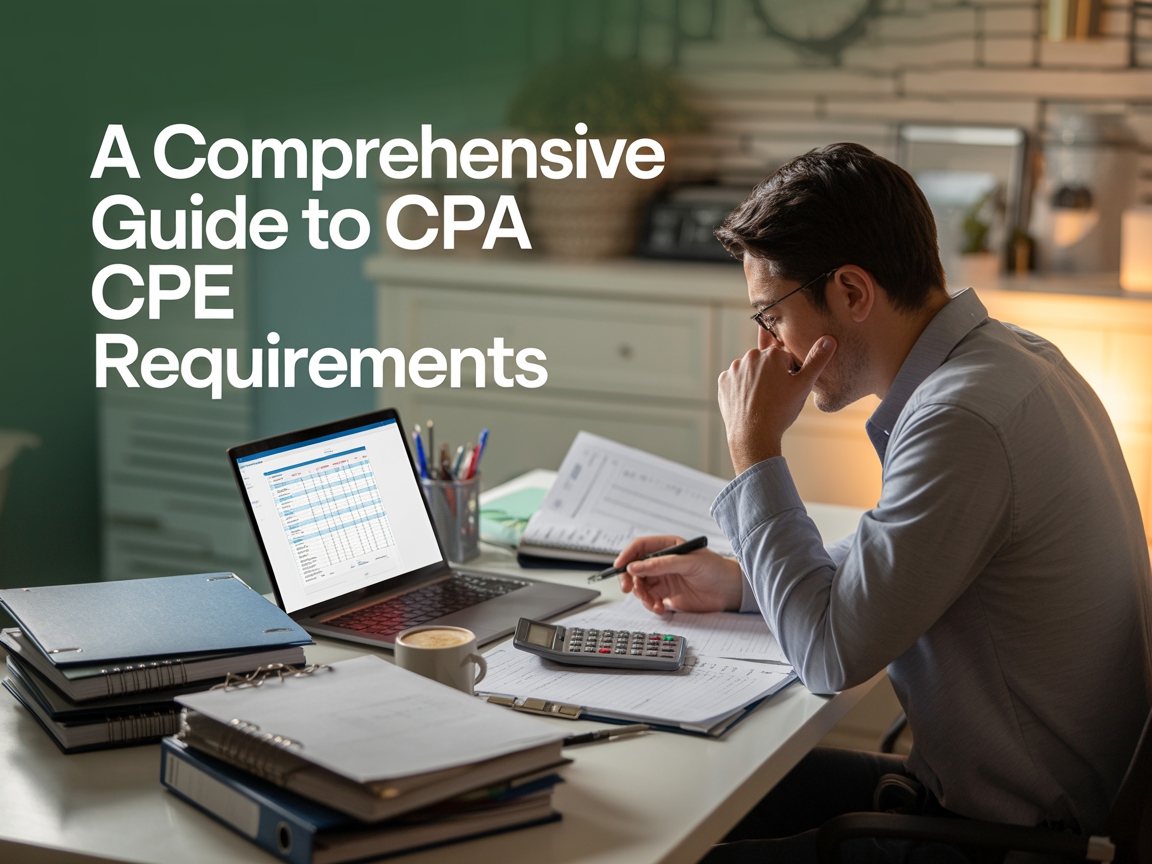A Comprehensive Guide to CPA CPE Requirements |
| The Last Self-Study CPE Website You Will Ever Need (Click for Subscriptions) |
Every CPA, irrespective of the specific field they’re working in, is required to fulfill their state board’s CPA CPE requirements. Whether you meet your CPA CPE requirements online or offline, it’ll help maintain your competence to deliver top-notch professional services.
The field of accounting encompasses a considerable number of fields of study that are continually changing, expanding, and becoming more complex. Therefore, if you desire to keep abreast of the latest changes and trends, pursuing CPE has to be your top priority.
However, in the context of meeting your CPA CPE requirements, you need to consider several important things. This is because each state board has its own requirements and guidelines and non-compliance with these may make it difficult for a CPA to maintain their designation.
We’ve created this page to provide you with the pieces of information you need to stay compliant with your CPA CPE requirements online or offline efficiently. Here, we’ll discuss several things including the importance of fulfilling these requirements on time and why most CPAs prefer to meet online CPA CPE requirements to the general things associated with CPE requirements CPA, and overviews of CPA CPE requirements by state.
Let’s delve deeper into these.
Here’re two key reasons why you must prioritize fulfilling your CPA renewal CPE requirements within your license renewal period.
If you want to maintain your CPA designation smoothly, timely fulfillment of your CPA CPE requirements is of paramount importance. In case you fail to obtain the required credits in accordance with your state board’s guidelines, it may consider you non-compliant with your requirements. This may cause you to obtain additional credits within an additional but fixed period of time.
Even if your state board has the provision of multiple grace periods, you must always try to fulfill the requirements on time. The reason is in case you cannot obtain the additional credits within their respective periods of time, your license may be temporarily revoked by your state board. And this may cause irreversible damage to your entire career.
If you want to know how many CPE hours are required for CPA active licenses, continue reading as we’ll discuss them in a later section.
As mentioned above, accounting is an ever-evolving field with continuously changing rules, regulations, and laws. And state boards design their CPA CPE requirements in a way that helps ensure that their CPAs get enough opportunities to maintain their professional competence by staying up-to-date with the latest changes in their respective fields.
Therefore, meeting these requirements on time help exhibit that you’re a true professional and want to provide your clients with the best services possible. In turn, this will enhance your employability significantly.

The following are the reasons why fulfilling CPE requirements CPA online can prove to be a prudent decision.
Whether it’s meeting CPE requirements for first-year CPAs or fulfilling CPE CPA requirements for the entire license renewal period, you’re required to complete a variety of courses. When you join a premier CPE sponsor of online courses, you’ll get instant access to all the programs you need to meet your requirements.
You won’t have to research multiple providers that offer in-person programs to ensure their credibility and the quality of their course materials. When meeting online CPA CPE requirements, you’ll need to do it only once in the entire renewal period. Whether your state board has triennial, biennial, or annual CPE requirements for CPAs, you’ll be able to obtain the required credits efficiently.
Another notable benefit of taking online courses to comply with your CPA CPE requirements is that you’ll get the certificate of completion for a program instantly after passing the final exam. This will be extremely useful in case you need to get some credits urgently.
Furthermore, some leading CPE providers, including CPEThink.com, let their CPAs take unlimited printouts of their certificates of completion. So, even if you misplace the actual one, you’ll get another one effortlessly.
In most cases, fulfilling CPA CPE requirements online proves to be cheaper than meeting them offline. Since, you need to complete a significant number of courses to meet your CPE requirements CPA, the total savings will be a considerable one.
Just remember to consider a few vital factors when deciding on the right CPE sponsor. First, it should offer quality programs at reasonable price points. Second, it should offer state-specific ethics courses so that you won’t have to look for another sponsor to meet your ethics requirements. Third, if it offers subscription packages, see whether or not you’ll be able to access these ethics courses using them.
Some CPE sponsors have affordable subscription packages but they exclude state-specific ethics courses. Purchasing ethics courses separately may be synonymous with paying a significant amount of additional money to meet your CPE CPA requirements.
While the above ones are the top benefits of meeting CPA CPE requirements online, it also has several other advantages. Some of these include an unequaled flexibility to complete the course content, the ability to manage your time efficiently, the ability to create a personalized study schedule, and the opportunity to avoid the additional cost of commuting.
While your CPE sponsor should provide you with all the information you need to comply with your CPA CPE requirements efficiently, you also need to be aware of some important things. Let’s take a look.
Here’re the overviews of the CPE CPA requirements of all states. To see the specific requirements of your jurisdiction, use the search option.
Hopefully, this page has given you enough information about CPA CPE requirements and prepared you to embark on your CPE journey with confidence. If you need more information about our courses or the benefits of fulfilling CPA CPE requirements online with us, contact us and we’ll be happy to answer your questions.
Check out what other customers are saying.